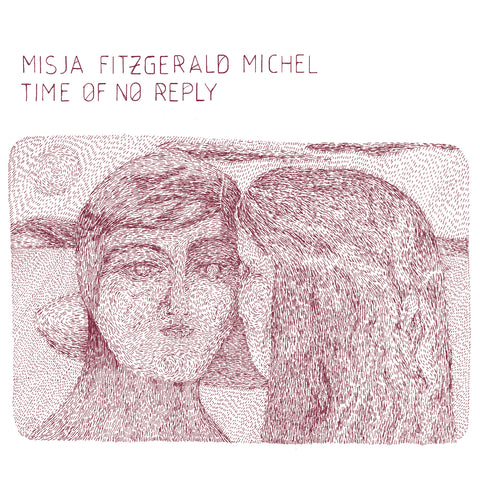All songs written and composed by Nick Drake and published by Warlock Music Ltd
Misja Fitzgerald-Michel - acoustic guitars (6 & 12 strings)
Olivier Koundouno - cello (2,6,7,11)
Nicolas Repac - programming (4,5)
Me'shell Ndegéocello - vocals (4)
Hugh Coltman - harmonica and vocals (11)
Thibaut Mullings - ebow + lap steel (5)
Florian Monchatre - effects (5)
Executive production and A&R : Laurent Bizot & Thibaut Mullings
Recorded by Fabien Girard (1,2,3,6,7,9) at Studio Juillaguet from August 29th to 31st 2010
Recorded by Florian Monchatre (4,5,8,10,11) at Microbe Studios on
December 14th 2010 and at Studio Soyuz from February 5th to 10th 2011
Mixed by Fabien Girard at Angoulême from May 25th to 28th 2011
Mastered by Raphael Jonin at Studio J RAPHi.n.g. on July 14th 2011
Illustration : Noémi Schipfer
Artwork : Element-s
Whenever someone mentions Nick Drake (1948-1974), the English singer-songwriter who passed away too young and at the height of his art, it is unfortunately more common to hear the rumor of the larger-than-life myth that surrounds him than it is to hear the innermost essence of his work. So many tales and stories have grown out of the short yet dense life of this genius. Nick Drake, the writer of three albums blessed by the muses of music yet ignored by his contemporaries, became acquainted with the highest peaks of beauty as much as the depths of failure and depression. And if we add his unjust fate to the mystery of his death (accidental medication overdose or suicide?), we will understand why he became the unwilling standard-bearer for an international community of cursed artists. Misunderstood while alive, and caricatured after his death...Tough double penalty for a man who, with troubling premonition, sang: “I was made to love magic/All its wonder to know/But you all lost that magic/Many many years ago”.
Misja Fitzgerald Michel only pays tribute to the magic of Nick Drake’s music on this mostly instrumental album where Me’shell Ndgeocello lends her voice and a few words to a song. A manner of saying that the voice of the Englishman is heard first and foremost in the notes and the rhythms he left to posterity. What Misja envies in Nick Drake is the musician and his spirit of invention, the incomparable beauty of his songs, the breadth of his language, the sophistication of his harmonies. The artist’s glow rather than his soul’s pain. It is only fair. But the Frenchman’s interpretations offer much more than that: they are exactly on key.
Misja’s first encounter with the songwriter’s music goes back to his childhood, thanks to his folk guitar playing father’s record collection and sharply tuned ears. But he had to make his own path as a jazz musician, with numerous chance (but fruitful) encounters. He had to give himself up completely to the ecstasy of creating music “that is dense and quite textured”, to the vertigo of thought and movement that we could hear on Encounter, his previous album on the Nø Førmat! label.
The concept of bare simplicity is one of the key ideas that brought Misja Fitzgerald Michel to Nick Drake’s world. Mainly because you don’t enter that world without stripping off a little part of yourself – especially on his guitar and vocal album Pink Moon(1972), a raw work of genius out of which five of the eleven tracks off Time of No Reply were taken. In his works, no matter how elaborate they may be, the English man never yielded to the temptation of superficiality or verbosity. His music is marked with a form of righteousness that resonates like a call for kindness and for the beauty in all of us: be it for the person listening to it or the person playing it, it demands the best of us and our innermost essence. Stripping layers off his work like he’s never done before, Misja heard that call; he too had the extreme humanity to respond to it with his own sensitivity and intuitions. He did not try to emulate the style of play or the technique of Nick Drake, did not use the complex harmonizations that the songwriter was fond of. He did not think it was relevant to try to compete with him in the singing department
The acoustic guitar is at the core of a disc that is much more than just another guitar record. First because here and there, other influences can be heard. Like that of the barrier-breaking cellist Olivier Koundouno, the arranger and lighting technician Nicolas Repacor the songwriter Hugh Coltman. Then because Misja, far from the isolated ghetto of “guitar music”, chose to adventure onto the boundless fields of musicality alone. His aesthetic choices stem from that adventure, that is, quite simply, a yearning for poetry and sensation. This explains his escapades towards baroque music or blues or even those appropriate freedoms taken with the compositions, either explored in the full scope of their harmonic possibilities, or brought back to their quintessential expression. Thus, everywhere, this lively celebration of a spirit of adventure and openness, that brings together a composer and an interpret who are forty years apart, draws a common space in which the inspirations and aspirations of one and the other can come together and mingle. Thus is the shining and initiatory path taken by Misja Fitzgerald Michel, on an album that sheds new light on the work of Nick Drake as much as on his own expression.



